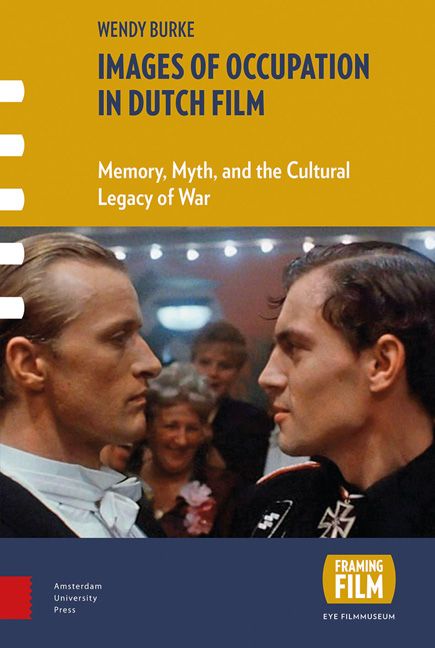Book contents
- Frontmatter
- Contents
- Acknowledgements
- Note on Translations
- List of Illustrations
- Dedication
- Introduction
- Chapter 1 Representation, Occupation, and Dutch War Films
- Chapter 2 The Image of the Enemy
- Chapter 3 Dutch Identity and ‘Dutchness’
- Chapter 4 Life Under Occupation
- Chapter 5 Resistance and Collaboration
- Conclusion
- Notes
- Filmography
- Bibliography
- Glossary of Dutch and German Terms
- Appendix Top dutch films by box office admissions
- Index
- Frontmatter
- Contents
- Acknowledgements
- Note on Translations
- List of Illustrations
- Dedication
- Introduction
- Chapter 1 Representation, Occupation, and Dutch War Films
- Chapter 2 The Image of the Enemy
- Chapter 3 Dutch Identity and ‘Dutchness’
- Chapter 4 Life Under Occupation
- Chapter 5 Resistance and Collaboration
- Conclusion
- Notes
- Filmography
- Bibliography
- Glossary of Dutch and German Terms
- Appendix Top dutch films by box office admissions
- Index
Summary
A DUTCH OCCUPATION: RE-WRITING AND RE-IMAGINING THE WAR
This book has explored in detail the trajectory of images of the German wartime occupation of the Netherlands in Dutch feature films, with an emphasis on films made between 1962 and 1986. It has revealed the complex, evolving role played by film in Dutch cultural memory and examined how film can embrace and assimilate the communal legacies of war. This was carried out via detailed readings of seven war films, alongside the consideration of a range of other films produced up to 2014. The key films were analysed according to four themes: the enemy, Dutch identity, life under occupation, and resistance and collaboration. Focusing in on ‘snapshots’, scenes, and ‘small moments of material life’ in the films (Kracauer 1997: 303)—alongside the interpretation of the filmic registers of cinematography, soundtrack, editing and spectatorial positioning—we came to identify significant changes over time in the films’ images of war. This was most noticeable in the progression from an early, ‘black-and-white’ response to the occupation, most evident in De Overval from 1962, towards much more complex, nuanced representations from the late 1970s through to the 1980s of the ambiguities and moral choices faced by Dutch citizens during the war. Distinctions between goed (Dutch) and fout (Germans or collaborating Dutch) became markedly less clear-cut in the films from Soldaat van Oranje (1977) onwards. The contrast between occupier and occupied had been at its most potent in De Overval, the scenes of which were replete with instances of representation by comparison—shots of vengeful, unfeeling German occupiers possessing a veneer of civility, followed by brutality, in contrast to the morally upright, conquering, heroic, intelligent, and unflinchingly patriotic Dutch citizens.
What is not shown in the films—what I have named representation by omision—became at times more telling than what was actually depicted. The absence of references to Jewish persecution, German friendship bonds, and the deprivations of the Hunger Winter in favour of heroic, unwavering resistance came to define De Overval (the myth of resistance was powerfully at work in this film).
- Type
- Chapter
- Information
- Images of Occupation in Dutch FilmMemory, Myth and the Cultural Legacy of War, pp. 211 - 214Publisher: Amsterdam University PressPrint publication year: 2017



